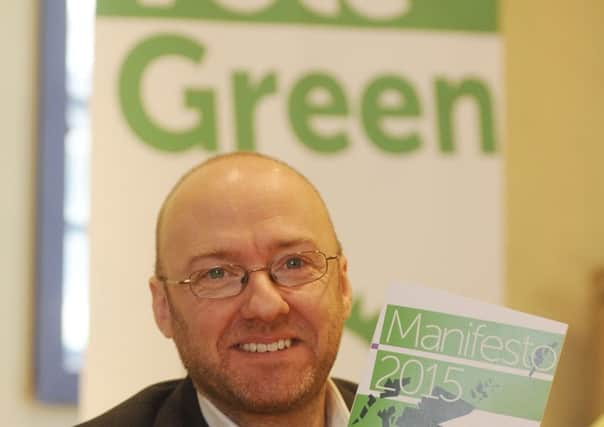Euan McColm: SNP popularity may see Greens suffer


What about the group of “creatives”, National Collective? What about Women for Independence? Didn’t the existence of these organisations prove, conclusively, that the Yes campaign was much more than just the SNP? That the head of National Collective has subsequently been employed by the SNP, while one of Women for Independence’s leading lights is now a special adviser to First Minister Nicola Sturgeon are simply happy coincidences.
But, even for those of us prone to doubts about the motives of political campaigners, there was one figure whose presence in the Yes Scotland campaign made it difficult to argue that it was an entirely Scot Nat affair.
Advertisement
Hide AdAdvertisement
Hide AdScottish Green Party co-convener Patrick Harvie played a significant role in the, ultimately unsuccessful, battle to win a Yes vote last year.
Harvie – a clever fellow and a very good debater – was frequently front and centre at Yes Scotland events. He and Sturgeon formed an impressive double act, warning that a No vote might mean terrible damage to the NHS or to welfare, and – when their battle was lost – he appeared to have, at least, won new converts to the Greens.
According to the party, it now has almost 9,000 members in Scotland, a four-fold increase on its numbers last year. And while this may pale into insignificance compared with the SNP’s remarkable surge to having a membership of more than 105,000, it marks a huge leap for a party that’s often struggled to make itself seem relevant.
Yet, for all these new members and Harvie’s much-increased public profile, the Scottish Greens are an irrelevance in the current general election campaign. Polls have their support at as little as one per cent (and, given the margins of error we can apply to such findings, we could argue that it may truly be zilch).
The SNP, on the other hand, look likely to win the votes of as many as half of all those Scots who turn up at a polling station on 7 May.
It does rather appear that Harvie’s reward for working so closely with the SNP during the referendum campaign is to be more support for the SNP.
Scottish Green activists will tell you that things will be different next year, when we’re asked to vote in the Holyrood elections. With a system that includes a degree of proportional representation, the party will do much better. What’s more, say some Scottish Greens, many of those who are voting SNP this year will revert to their preferred party in 2016.
Effectively, the Scottish Green Party is consoling itself with the “truth” that its supporters are lending their votes to the SNP in this general election in support of what they believe to be the greater good – the ultimate break-up of the UK.
Advertisement
Hide AdAdvertisement
Hide AdWe have heard this votes-on-loan theory before, from another quarter. When, in 2007, the SNP won its first Holyrood election, the Scottish Labour Party insisted that many of those who had backed Alex Salmond to become first minister would come back to the fold in the 2010 general election.
This, it transpired, was the case and the SNP returned just six of Scotland’s 59 Westminster MPs.
Times have changed. The SNP is racing towards a decisive Scottish victory next month. Labour, for so long the dominant political force in Scotland, faces a drubbing of humiliating proportions.
With the dynamic of Scottish politics now changed (who cares about debating policies when the constitution is the obsession of so many?), what of the Scottish Greens’ prospects next year?
Are we seriously to believe that those voters who are backing the SNP this year will share their second votes with Harvie and Co next year?
That would make no sense.
Yes, the regional lists from which 56 of our MSPs are elected provide a way in to parliament for the Greens, but a committed believer in independence may well find that supporting anyone but the SNP with that second vote does nothing more than let Labour, Conservative, or Liberal Democrat candidates squeeze through.
Sturgeon may well have been hugely chummy with Harvie last year, but her message to Yes-inclined Scots next year will be that only a vote for the SNP in both the Holyrood constituencies and the regional lists can bring about another overall majority of pro-independence MSPs.
The Scottish Greens are not aided at this time by the performance of their colleague, Natalie Bennett, south of the Border. The party in Scotland, quite correctly, points out that it is a separate entity from the English organisation.
Advertisement
Hide AdAdvertisement
Hide AdBut, whether Harvie likes it or not (and, I suspect, he doesn’t because, well, he’s clearly a politician and she’s a well-meaning but hopeless case), Bennett’s is currently the dominant voice in UK Green politics.
What was characterised by the party in England as a “Green surge” is likely only to see the return of its sole MP, Caroline Lucas, next month. Should Bennett get in as well, and double the Green ranks, it will be no thanks to her own efforts.
Harvie’s predecessor as Scottish Green Party leader, Robin Harper, is opposed to Scottish independence. He argued that the party should back a No vote, saying that nationalism was inconsistent with its values.
Harper lost that battle in a perfectly democratic vote which saw the Greens throw in their lot with the SNP.
I wonder whether the party might live to regret that.
Since the creation of the Scottish Parliament in 1999, the Scottish Greens have built support on a distinctive policy agenda based around environmental issues. But, when it comes to cast our Holyrood votes next year, will anyone hear Patrick Harvie over the ongoing row about the constitution? «